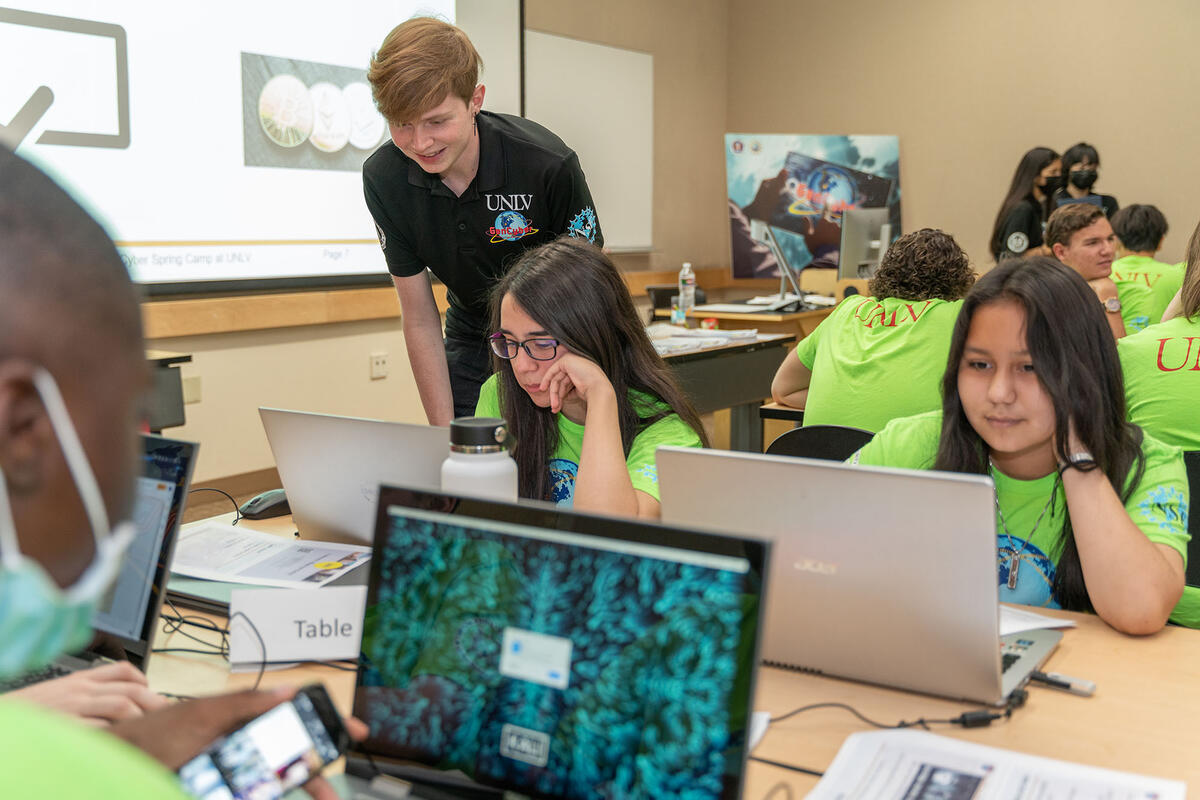Computer science juniors Bryce Sowers and Bianca Ionescu are setting up the room and prepping materials for today’s GenCyber camp activities for some 35+ middle and high school students arrive later in the morning. Sowers and Ionescu, along with 10 other UNLV undergraduate and graduate students are mentors and teaching assistants for the week-long summer camp. And both have intimate knowledge of the camp, having been participants themselves while attending Las Vegas Academy (LVA) high school.
“Although we were both music majors at LVA, we didn’t actually know each other,” says Sowers. “But I did recognize Bianca when she attended a camp alumni event when I was in GenCyber a year after her.”
When asked, as young musicians, how they both ended up in a cybersecurity camp, Sowers and Ionescu admit there was probably a little parental pressure involved. But, once in camp, their interest was piqued.
“I had never learned about cybersecurity before,” says Ionescu. “But during the camp there was something that really stuck with me when I heard it: by 2021, cybercrime would be costing the world $6 trillion.”
That made cybercrime the world’s third-largest GDP after the U.S. and China.

Even though she was previously headstrong in being a music major in college, the introduction to cybersecurity opened up a new path, and new opportunities. While still passionate about the viola, Ionescu sees her future in cybersecurity. “I’m interested in helping others and keeping them safe,” says Ionescu. “I want to be part of the solution.”
Sowers is interested in being a security engineer and would like to find an internship as an IT auditor. “Right now I’m part of a group consulting with small businesses on their cybersecurity needs for a research project, and it’s really interesting,” he says.
According to computer science professor and camp director, Ju-Yeon Jo, it is really important to have current UNLV students be active and involved as mentors because they are so relatable. Especially when those mentors were prior camp participants themselves.
Ionescu adds, “Bryce and I being music majors and coming from a nontraditional computer science background shows the kids in camp that anyone can learn it."
The GenCyber camp is jointly funded by National Science Foundation and National Security Administration. The goal is to increase awareness and interest in cybersecurity topics and careers, and ultimately help solve the nation’s shortfall of skilled cybersecurity professionals.
“The first few years planning and executing the camp were quite challenging,” shares Jo. “Seeing the students grow and learn during camp was definitely rewarding. But now, having prior camp participants actually decide to enroll at UNLV in computer science, continue their interest in cybersecurity, and become part of the GenCyber camp team for new students – that’s the real payoff.”
Since the camp began four years ago, Jo and fellow computer science professor, Yoohwan Kim have learned a lot and tweaked it based on their experiences and student feedback. However, some important aspects have remained the same.
“We definitely want the students who participate to associate the camp with fun,” says Kim. “We don’t want it to just be an extension of school work or feel like they’re attending school over summer.”
One way they accomplish this is through incorporating a different theme or key project each year. The first year the participants worked on a cyber drama – a theatrical production of a cyber topic. The second year Jo and Kim timed their camp with the Colloquium for Information Systems Security Education conference taking place that year in Las Vegas. Working with organizers of the event, they were able to have their students not only attend the conference, but create and present posters at it. Last year students created digital animations related to cybersecurity, while this year they are doing hands-on IoT (Internet of Things) security projects.
Games, scavenger hunts, and competitions for prizes also play a big role.
“This year we created our own cryptocurrency for the camp,” said Kim. “We and our TAs give out coins for certain activities and on the last day of camp, whoever has the most coins will get free tickets to DEFCON, worth $370.”
DEFCON is the largest hacking and security conference and takes place each year in Las Vegas. One benefit of UNLV's location in one of the world’s top convention destinations is that students have access to major industry events.
Based on positive assessments, UNLV’s GenCyber camp has received funding for 2023 ensuring that Jo, Kim, and their TAs will be able to introduce cybersecurity to another new group of students next summer, and continue building a pipeline of cybersecurity professionals.



